Buying a house with bad credit is possible if you know your options. Start by checking your credit report for errors and work on improving your score by paying down debt and avoiding new credit. Look into government-backed loans like FHA, VA, or USDA, which have lower credit requirements. Save for a larger down payment to strengthen your application and reduce higher interest rates. Discover how to navigate these steps and make homeownership a reality.
Key Takeaways
- Explore FHA loans, which accept credit scores as low as 500 with a 10% down payment.
- Improve credit by disputing errors, paying bills on time, and lowering credit utilization.
- Consider VA loans, which have no official minimum credit score and require no down payment.
- Save for a larger down payment to offset bad credit and reduce lender risk.
- Explore seller financing or hard money loans for alternative bad credit home-buying options.
Understanding Bad Credit and Home Buying
While buying a home with bad credit can feel overwhelming, it’s not impossible. Your credit score plays a significant role in determining your mortgage options, and a credit score range below 580 is typically considered bad credit. However, certain mortgage lenders specialize in helping buyers secure a bad credit home. Government-backed loans like FHA, VA, and USDA loans often have more flexible credit requirements compared to conventional loans. For instance, FHA loans accept credit scores as low as 500 with a 10% down payment, while VA and USDA loans may approve applicants with scores in the 580-620 range. Keep in mind that a lower credit score can lead to higher interest rates, impacting the overall cost of your mortgage. Reviewing your credit history and understanding these programs can help you navigate the process effectively. Additionally, exploring hard money loans can provide an alternative financing option for those with less-than-perfect credit. By exploring these options, you can find a path to homeownership despite your credit challenges.
Steps to Improve Credit Before Purchasing
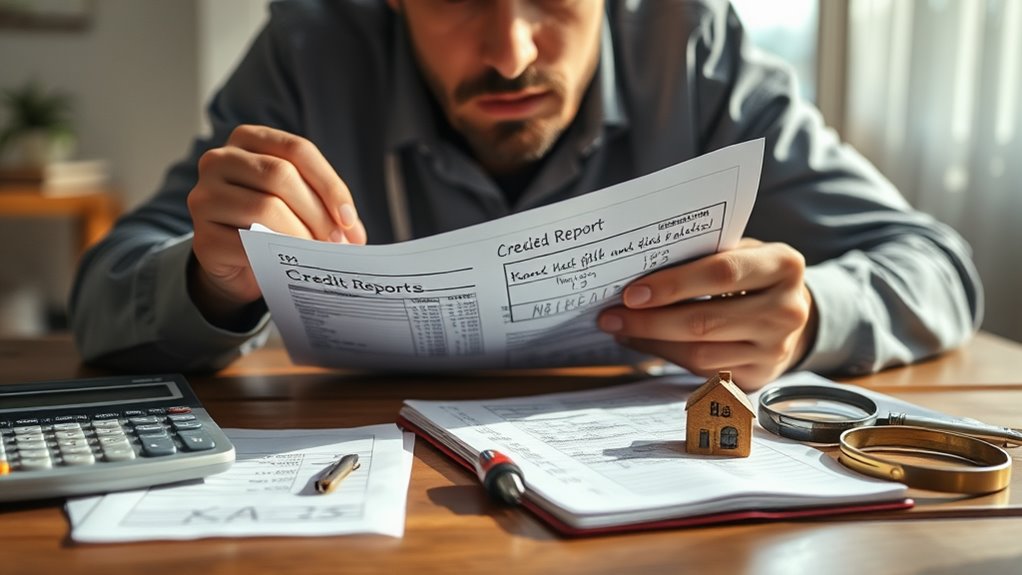
If you’re planning to buy a home but have bad credit, taking steps to improve your score can make a significant difference. Start by reviewing your credit report for errors and disputing inaccuracies, as correcting these can boost your credit score. Keep your payment history strong by making all payments on time, as it’s the most influential factor in FICO scoring. Lower your credit utilization ratio by paying down existing debts, which accounts for 30% of your score. Avoid applying for new credit lines to prevent hard inquiries, which can temporarily lower your score. Consider using rapid rescore services to quickly update your credit report with recent positive changes, potentially helping you meet the minimum credit score required for a mortgage. Improving your credit also positively impacts your debt-to-income ratio, a key factor lenders consider. Exploring seller financing options may provide more flexible terms compared to conventional loans, especially if you’re working on improving your credit.
Financing Options for Buyers With Bad Credit

You may qualify for an FHA loan with a credit score as low as 500 if you’re able to make a 10% down payment, or 580 with just 3.5% down. VA loans don’t have an official credit score minimum, but most lenders prefer a score of at least 620 for approval. Both options provide accessible pathways to homeownership, even with less-than-perfect credit. Additionally, seller financing can be a viable alternative for buyers with credit challenges, offering flexible terms and quicker closings.
FHA Loan Benefits
Because FHA loans are backed by the Federal Housing Administration, they’re a strong option for buyers with lower credit scores. These home loans for bad credit help you qualify even if you’ve struggled to meet the credit score required by conventional loan programs. With FHA loans, you’ll enjoy flexibility in other areas, too. Here’s why they stand out:
- Lower Minimum Down Payment: You’ll need as little as 3.5% down if your credit score is 580 or higher.
- More Flexible Credit Requirements: A credit score as low as 500 is acceptable with a 10% down payment.
- Higher Debt-to-Income Ratio Allowed: FHA loans accommodate borrowers with higher financial obligations.
- Accessible Mortgage Insurance: While mortgage insurance premiums are required, they make these loans achievable for more buyers.
- Debt Service Coverage Ratio: FHA loans do not require a DSCR for approval, unlike DSCR loans that focus on property cash flow.
FHA loans open doors when other Mortgage With Bad Credit options feel out of reach.
VA Loan Details
VA loans provide another viable path for buyers with bad credit, particularly for veterans and active-duty service members. These loans, backed by the Department of Veterans Affairs, don’t impose an official minimum credit score, though lenders often require at least 580. One of the biggest advantages is the no down payment requirement, making homeownership more accessible. Unlike other loan types, VA loans don’t require private mortgage insurance, even with 0% down, which can substantially lower monthly payments. Even with poor credit, you may still secure competitive interest rates, often better than conventional loans. Eligibility extends to veterans and active-duty service members, offering a chance to qualify despite financial challenges. By reducing lender risk, the VA program makes it easier for you to achieve homeownership, even with less-than-perfect credit. VA loans emphasize long-term stability, similar to DSCR loans, which focus on sustainable cash flow for rental properties.
Strategies for Getting Approved With Bad Credit
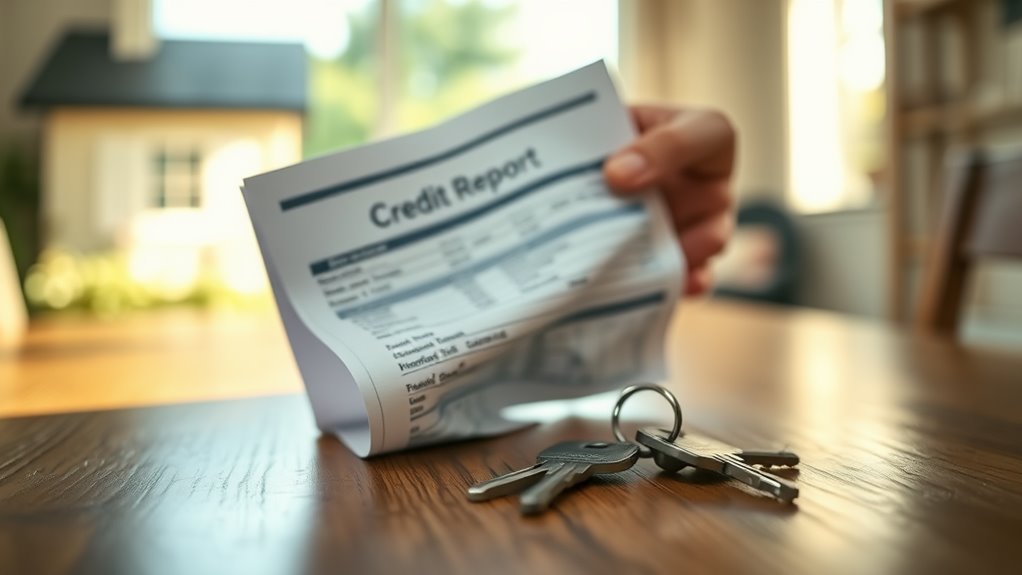
You can boost your approval odds by saving for a larger down payment, as it reduces the lender’s risk. Lowering your debt-to-income ratio under 43% shows financial responsibility and improves your application. Adding a co-signer with stronger credit may also help secure a more favorable mortgage. Consider exploring down payment assistance programs to minimize upfront costs and improve your financial position.
Increase Down Payment
Even with bad credit, increasing your down payment can markedly improve your chances of securing a mortgage. A larger down payment reduces the loan-to-value ratio, making lenders more likely to approve your application despite a low credit score. Here’s how it works:
- Eliminate PMI: Save for a larger down payment of 20% or more to avoid private mortgage insurance (PMI) on conventional loans.
- Offset Risk: A higher down payment compensates for a low credit score, potentially securing better interest rates.
- Meet FHA Requirements: FHA loans require 3.5% down with a 580+ credit score or 10% for scores between 500-579.
- Exceed Minimums: Some lenders may accept a below-minimum credit score if your down payment exceeds their standard requirements.
- Build Financial Foundations: Establishing a strong credit history with a score above 700 can further enhance your mortgage approval chances and secure favorable rates.
Reduce Debt Ratio
Reducing your debt ratio is another effective step to improve your mortgage approval odds with bad credit. Lenders assess your debt-to-income ratio (DTI) to gauge financial stability, and a lower ratio increases your chances of securing a home loan. Start by paying down outstanding debt, especially credit card balances, to reduce credit utilization below 30%. Consolidate high-interest debts into a single loan with lower monthly payments to ease your financial burden. Avoid taking on new debt or opening credit accounts before submitting your mortgage application. Focus on paying off smaller debts first to minimize active accounts. By lowering debt and managing monthly payments effectively, you’ll improve your DTI, ideally keeping it below 43%, and enhance your profile as a reliable borrower. Additionally, consider exploring loan modification options as a way to reduce your monthly mortgage payments and improve your financial situation.
| Strategy | Benefit |
|---|---|
| Pay off credit card balances | Lowers credit utilization |
| Consolidate high-interest debt | Reduces monthly payments |
| Avoid new debt | Improves debt-to-income ratio |
Add a Cosigner
When facing challenges with bad credit, adding a cosigner to your mortgage application can substantially enhance your eligibility. A cosigner with a strong credit score and stable income offsets your poor credit history, increasing your chances of loan approval. Lenders view them as additional security, potentially qualifying you for lower interest rates or better terms. However, make sure the cosigner understands their responsibility, as they’ll be liable if you default.
- Strong Credit Profile: Choose a cosigner with a high credit score and low DTI.
- Stable Income: Their consistent earnings reassure lenders of repayment capability.
- Joint Responsibility: Discuss financial implications, as they’ll share the burden.
- Verify Eligibility: Confirm your mortgage program allows cosigners.
Adding a cosigner can be a strategic step toward homeownership despite bad credit.
Impact of Low Credit Score on Costs
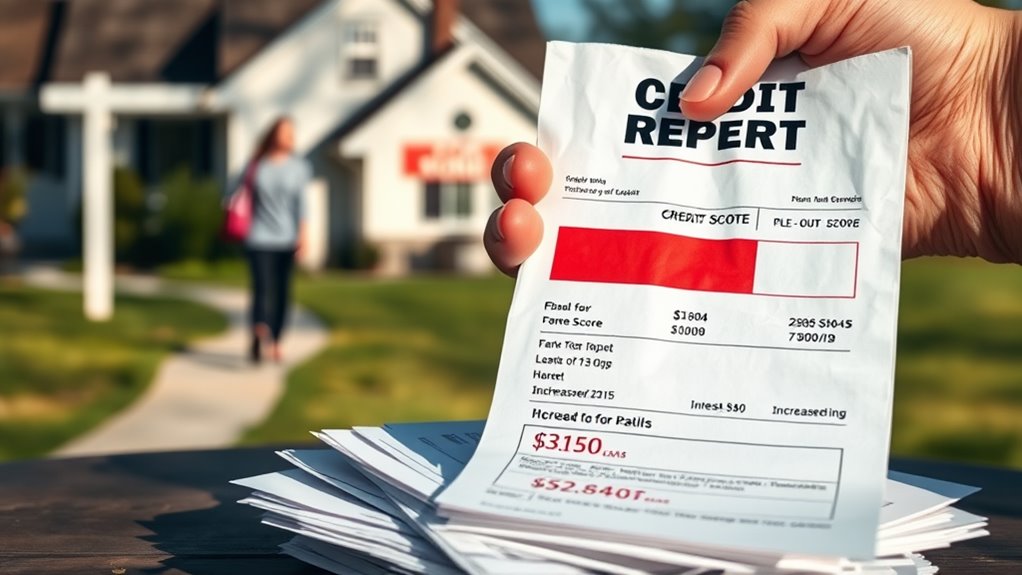
If your credit score is on the lower end, it’s likely to markedly increase the costs of buying a home. With a bad credit score, you’ll face a higher interest rate, which directly impacts your loan amount and long-term financial obligations. Lenders perceive a lower credit score as a higher risk, leading to stricter DTI requirements and additional fees. For example, a mortgage interest rate for someone with a 580 score could be notably higher than someone with a 660 score. While programs like FHA loans have lower credit requirements than conventional loans, they still impose additional costs, such as mortgage insurance premiums. Here’s a breakdown of how credit scores affect costs:
| Credit Score Range | Interest Rate (%) | Additional Costs Over Loan Term |
|---|---|---|
| 580-619 | 6.5 | $84,625+ |
| 620-659 | 5.5 | $50,000+ |
| 660+ | 4.5 | Minimal |
Your lender will look closely at your credit history, so understanding these impacts is essential.
Government-Backed Loan Programs
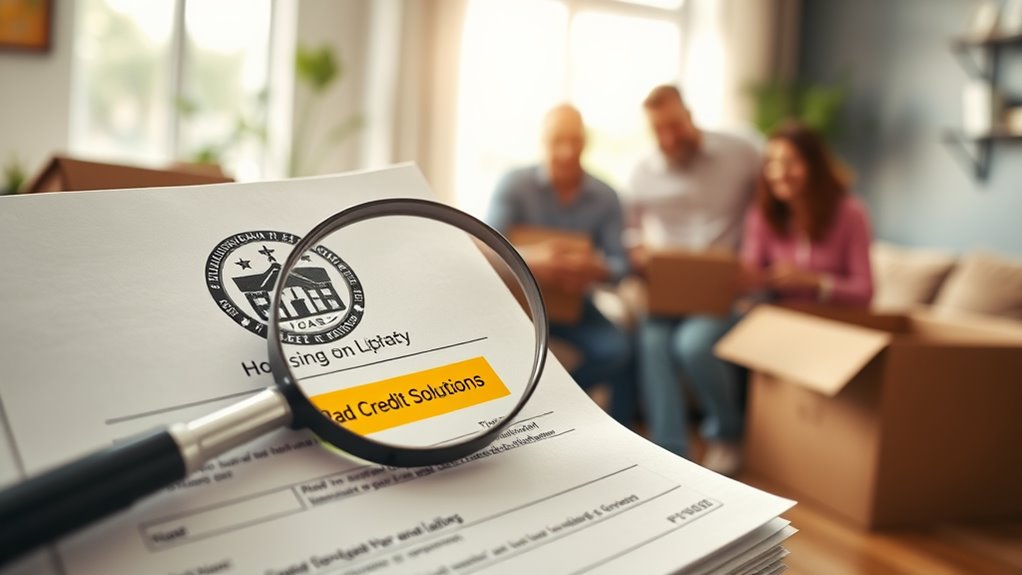
Government-backed loan programs can be a lifeline for homebuyers with bad credit, offering more flexible requirements than conventional mortgages. These programs are designed to make homeownership accessible even if your credit isn’t perfect. For instance, FHA loans, backed by the Federal Housing Administration (FHA), allow a minimum credit score of 500 with a 10% down payment or 580 with just 3.5%. VA loans, available to veterans and active-duty service members, don’t have a strict minimum credit score, though lenders often look for 620 or higher. USDA loans, supported by the Department of Agriculture, typically require a 640 score for rural homebuyers. Additionally, HomeReady® and Home Possible® programs offer options with a minimum 620 score and low down payment requirements, making them ideal for first-time or low-income buyers.
- FHA Loans: Minimum 500 credit score (10% down) or 580 (3.5% down).
- VA Loans: No official minimum, but lenders often require 620+.
- USDA Loans: Typically 640+ for rural homebuyers.
- HomeReady®/Home Possible®: 620+ score and 3-5% down payment.
These programs can help you secure a home despite credit challenges.
Specialized Programs and Local Assistance
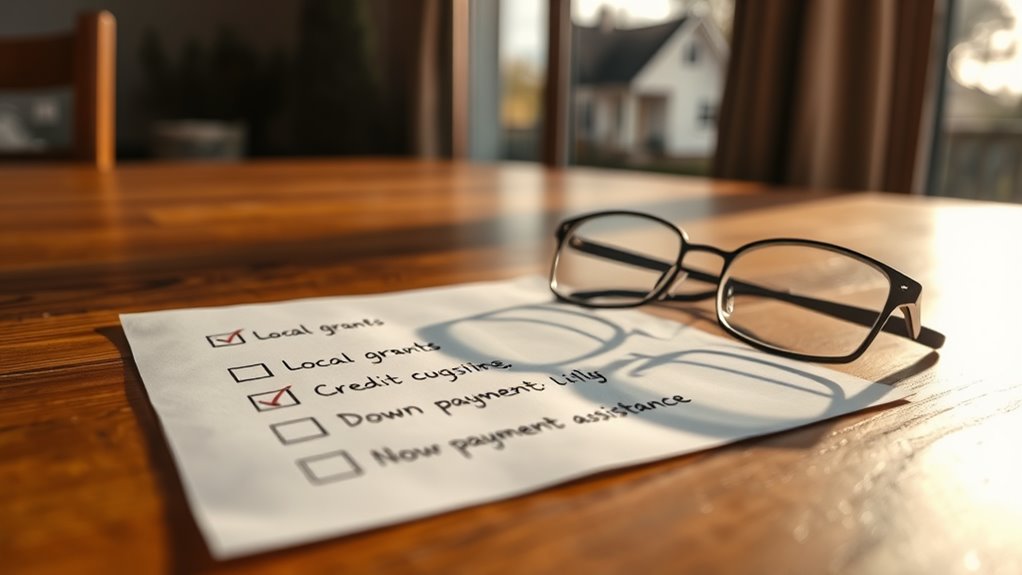
Even if you’re struggling with bad credit, specialized programs and local assistance in Texas can provide tailored solutions to help you achieve homeownership. The Texas Department of Housing and Community Affairs (TDHCA) offers down payment assistance and low-interest loans for first-time home buyers with credit scores as low as 580. Explore the Bootstrap Loan Program, which provides affordable financing for eligible buyers with bad credit to build or purchase a home. If you’re a veteran or active service member, the VA Home Loan program can help you secure a no-down-payment loan, even with poor credit. For those in rural areas, USDA Rural Development loans support buyers with bad credit, often without strict credit score minimums. Local housing authorities in Texas also administer first-time homebuyer programs with flexible credit requirements. Combine these resources with Federal Housing Administration (FHA) loans to maximize your opportunities despite a challenging credit history.
Tips for Strengthening Your Loan Application
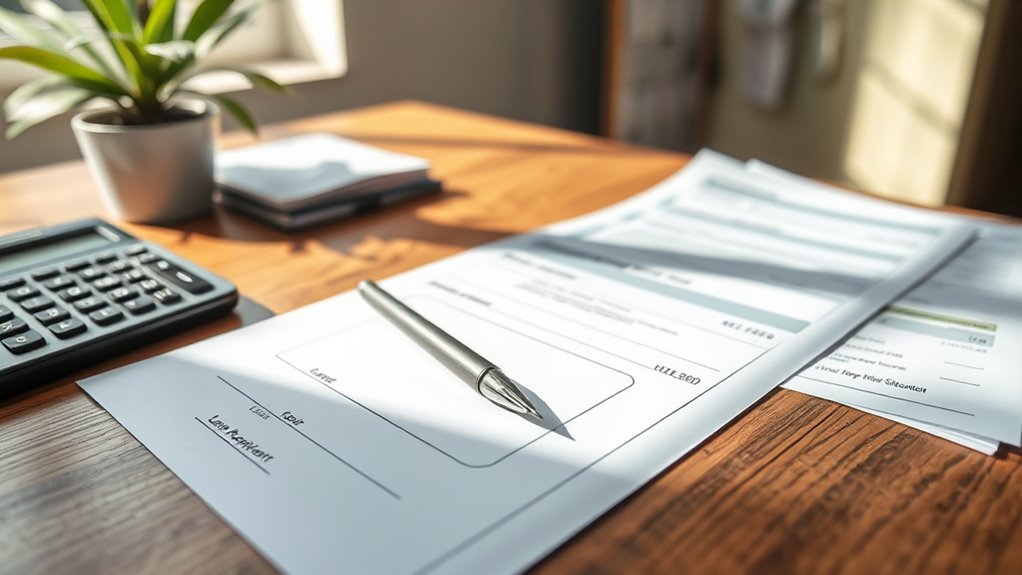
Although bad credit can make the homebuying process challenging, you can strengthen your loan application by taking strategic steps. Lenders want to see financial stability and a commitment to repay the loan, so focus on improving key aspects of your profile. Here’s how you can make your application more appealing:
- Increase your down payment: Saving for a larger down payment, ideally 20% or more, reduces lender risk and improves your chances of loan approval.
- Lower your debt-to-income ratio: Aim to keep this ratio below 43% by paying down debts, which reassures lenders of your financial stability.
- Add a co-signer: Partnering with someone who has a strong credit history can offset your low score and bolster your application.
- Show stable income and employment history: Provide documentation that demonstrates consistent earnings and long-term employment, as this reassures lenders of your ability to repay the loan.
Additionally, consider using rapid rescore services to update your credit report with recent improvements before submitting your application.
Evaluating the Best Time to Buy a Home

After taking steps to strengthen your loan application, it’s also important to assess whether the timing aligns with market conditions. Interest rates play a significant role; if they’re below 5%, it’s often an ideal time to buy, as lower rates reduce your monthly payment and long-term costs. Look for areas where home prices have dropped by 5-10%, as this indicates a buyer-friendly market. A stable or growing job market in your region boosts confidence in sustaining homeownership. Additionally, when inventory levels exceed six months, you’ll have more negotiating power and better options. If you’re managing bad credit, consider waiting until your credit score improves by 50 points. This small boost could save you thousands in interest over your loan’s life. Timing your purchase strategically guarantees you secure a home while minimizing financial strain.
Conclusion
Buying a home with bad credit is like climbing a hill with a heavy backpack—challenging but not impossible. Start by lightening the load: improve your credit score, save for a larger down payment, and explore government-backed loans like FHA. With a 580 credit score, you might qualify for FHA financing with as little as 3.5% down. Stay disciplined, and you’ll reach the top with keys in hand and a stronger financial foundation for the future.




